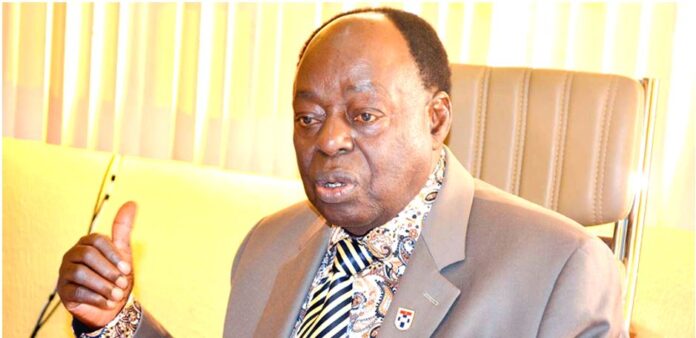Afe Babalola wants retired Judges, not active Judges, so court cases won’t stop
By Jeph Ajobaju, Chief Copy Editor
Afe Babalola, SAN has advocated that current Judges should not chair election petition tribunals to prevent the stoppage of the adjudication of cases unrelated to elections, as part of a total overhaul required in the judiciary to foster justice.
He said retired Judges and respectable Senior Advocates of Nigeria (SANs) should constitute election tribunal Judges in order to free up regular court Judges.
“Our judiciary today needs a total overhaul and you cannot do it without a new Constitution. I have about three cases myself in respect of matters arising from the university,” Babalola disclosed an event in Ado-Ekiti which marked his 60th anniversary at the Bar, according to reporting by The PUNCH.
“For the past four years, these cases have been on. We have some Judges here, the headquarters won’t be able to sit for many months because they are handling what they call election petitions.
“Election petitions should not be handled by sitting Judges, they should be decided only by the committee set up consisting of senior advocates and retired Judges in that case regular courts would not close down.”
Dignitaries at the event included former President Olusegun Obasanjo; Bishop of the Catholic Diocese of Sokoto, Matthew Kukah; Human rights activist Femi Falana, SAN; former Commonwealth Secretary General, Emeka Anyaoku; and the Ooni of Ife, Adeyeye Ogunwusi.
__________________________________________________________________
Related articles:
Ariwoola tells Judges to deliver justice, restore confidence in judiciary amid election petitions
Courts convict 1,144 financial crime culprits, CJN discloses
Judge suspends Stella Oduah’s trial over threat to his life
__________________________________________________________________
Jega knocking judges for bribe in a circular argument
Judges again came under the spotlight in December 2021 for taking bribe to pervert justice in Nigeria whose number one disease is financial corruption that percolates from Aso Rock through Governors and council Chairmen down to the man on the street.
Former Independent National Electoral Commission (INEC) Chairman, Attahiru Jega, levelled the accusation saying some judges get onto election tribunals to corruptly enrich themselves by selling judgment to the highest bidder.
But it is a circular argument: Nigerian judges take bribe because they are poorly paid; judges are poorly paid because public officials steal from the treasury, so there is no money to pay judges well.
There is no lawful justification for anyone to collect bribe or steal. If you are not well paid in one job, get another job in that same profession or in another field.
Even if you pay judges high salaries, the corrupt among them will still collect bribe and bend the law. But when you deprive them of decent pay and working conditions you tempt even the righteous to sin.
Corruption is woven deep into the Nigerian culture which makes it easy for anyone without the fear of God to find justification for taking bribe or dipping hand in the till.
The case of poor remuneration for judges is a good example.
How poor salary tempts judges to take bribe
Then-Chief Justice of Nigeria (CJN) Ibrahim Muhammad and Court of Appeal President Monica Dongban-Mensem both repeated in 2021 the historical truth that judges are poorly paid and also lack modern court equipment to effectively administer justice.
The political class and the elite deprive judges of good salary and good working conditions. They create the circumstances for judges to collect bribe. Then they turn round to accuse judges of corruption.
On 13 September 2021, Dongban-Mensem asked the federal government to raise the salaries of judges at the maiden edition of the Court of Appeal 2021/2022 new legal year ceremony in Abuja.
She said the salaries of judicial officers had stagnated since 2007.
She disclosed the monthly salaries of the highest judges as:
- CJN, who heads the judiciary – N279,497
- CJN’s colleagues on the Supreme Court – N206,425
- Appeal Court President – N206,425
- other judges on the Court of Appeal – N166,285
If the highest judges in the land earn this little, one can only imagine how the lower ranks are paid even more poorly.
In Lagos, council Chairmen are paid N400,000 per month plus benefits.
Lawmakers’ salaries in US, Nigeria
Below is the table of the yearly salaries of members of Congress in the United States from where Nigeria copied its presidential system
- Senators and House Representatives – $174,000
- Resident Commissioner from Puerto Rico – $174,000
- President pro tempore of the Senate – $193,400
- Majority leader and minority leader of the Senate – $193,400
Nigeria’s federal lawmakers are the highest paid in the world. They fixed the pay for themselves and have kept it secret because it is so huge that everyone will be too embarrassed if it were made public.
What is not kept secret, however, is that Senators are paid N1.24 million monthly to buy newspapers, which is 248 times higher than the N5,000 doctors in public hospitals used to get monthly hazard allowance until it was raised to N30,000 in 2022.
A report by Stears Business (https://www.stearsng.com/article/how-much-does-lawmaking-cost-nigerians) in 2019 said Nigerian Senators earn $597,000 per year in salaries and allowances ($49,750 per month).
“This results in a total of ₦20 billion ($65 million) per year and ₦79 billion ($260 million) at the end of each legislative tenure.
“Given that the members of the Senate are only required to sit for at least 180 days a year, this equates to ₦1 million a day,” the publication said.
Former Senator Shehu Sani disclosed in March 2018 that each Senator receives N13.5 million monthly as running cost plus N750,000 monthly consolidated salary and allowances.
House of Representatives member Simon Karu disclosed at a public forum in Abuja in October 2020 that
“The official salary of a member, House of Representatives which I also receive monthly is N800,0000. I told you I was going to say it, why don’t you wait for me to say it? The office running cost of a member of the House of Representatives is N8.5 million.”
Another House member at the event, Nicholas Ossai – who was embarrassed at the disclosure – shouted Karu down.
“I have never received such salary since I came to the National Assembly and I have been in the National Assembly before him,” Ossai said.
In June 2021, an Abuja Federal High Court ruled that lawmakers violate the law by fixing their salary and ordered that it should henceforth be done by the Revenue Mobilisation Allocation and Fiscal Commission (RMAFC), the only body empowered by law to fix the salaries of all federal public officials.
But nobody can be sure the order would be obeyed.
Muhammadu Buhari, his ministers, and other public officials did not obey court judgments, prompting Socio-Economic Rights and Accountability Project (SERAP) to threaten him with contempt of court proceedings.
In UK, police chief earns more than Prime Minister
Former London Metropolitan Police Commissioner Cressida Dicks earned £230,000 per year (£19,166 per month) plus benefits.
When she took the job in 2017, London Mayor Sadiq Khan offered her £270,648 plus benefits, the same as her predecessor Bernard Hogan-Howe received. But she chose to earn £40,000 less, according to the BBC.
Even with her voluntary pay cut, Dicks earned £72,628 per year more than then-British Prime Minister Boris Johnson, who was entitled to £161,866 plus benefits but claims £157,372.
When Nigerian lawmakers visited London some years ago as part of their usual jamboree, they asked then-Prime Minister Theresa May why the Met Police Commissioner earned more than her. She said: “Without him I cannot do my job.”
So, simply slagging off poorly paid public officials for collecting bribe will not solve the problem. Bribe givers and takers must be prosecuted and jailed. And the fundamental flaws in the culture that breed corruption must be fixed.
Nigerian judges retire to escape sanction
Jega, a professor of politics and former Vice Chancellor of Bayero University, Kano (BUK), said after collecting bribe, judges quickly retire to avoid being sanctioned by the National Judicial Council (NJC).
He made the point in a lecture he delivered at the Owolabi Afuye Memorial Lecture organised by the Nigerian Bar Association (NBA) Ibadan branch as one of the events to mark its 2021 Law Week.
His words: “Some senior lawyers have become stupendously wealthy defending corrupt public officials, or handling electoral litigation for governorship and presidential candidates.
“Similarly, many judges have become notorious for corrupt enrichment for ‘cash and carry’ judgments, especially in election matters generally and in election tribunals, more specifically.
“Some election tribunal appointments were in the past widely said to have been made to senior judges about to retire, who allegedly ‘sold’ judgments, most likely to the highest bidders, enriched themselves and quickly retired to avoid being sanctioned by the National Judicial Council.
“When lawyers use technicalities to subvert justice and ‘win’ cases without regard to perpetration of injustices, they basically help to undermine, rather than enhance national development, peaceful coexistence and security.
“They discard ethical and professional conduct, and put parochial and/or self-serving objectives in the forefront of their practices.”
Call for NBA, Body of Benchers to intervene
Jega urged the NBA and the Body of Benchers to urgently address the corruption in their ranks to stave off more crisis.
He said while many may argue with those who describe Nigeria as a failed state, no one would dispute that the country is fast failing.
“Specifically, on insecurity, a combination of militancy, insurgency, banditry, farmer-herder conflicts, kidnapping for ransom, and ethno-religious or communal conflicts, with evident lack of competence and capacity to address these challenges, has unleashed generalised individual and collective apprehension, palpable insecurity and fatalistic resignation.
“Many citizens have been killed, maimed, raped, displaced, and properties stolen, confiscated and/or destroyed.
“Hundreds of thousands of citizens have been staying in Internally Displaced Persons camps for long, with the future of children compromised by malnutrition, diseases, and prolonged abandonment of schooling.
“In some areas of the country, notably North-East and North-West geopolitical zones, famine is imminent, as insurgents and/or bandits have obstructed farming and agrarian food production and destabilised the rural economy, with outright killing of whoever ventures out to their farms, or imposition heavy taxation on those allowed to farm.
“Indeed, things have been so bad for so long that, some scholars are beginning to perceive Nigeria now, perhaps exaggeratedly, as a ‘failed state.’”







